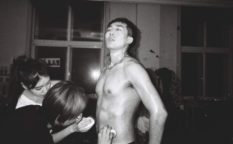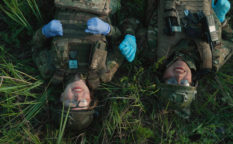Agnès Varda is a director who didn’t lose her vigilance, passion, curiosity and love for humankind until the end
For the last month, MUBI has been showcasing some of the works of the late French director Agnès Varda in commemoration of her work past and present. We are briefly reflecting on her style in Beaches of Agnès while exploring it in relation to her other films. This is a director who didn’t lose her vigilance, humour, passion, curiosity and love for humankind until the end.
In her beautiful and poignant film from 2008, Beaches of Agnès, almost a decade before joining her late husband in death, director Jacques Demy, Varda made a film of her life about cinema, art, friends, loves, growing up, her family, her preoccupations and artistic inspirations. It’s also about the beaches of her life, from growing up on the Belgian coastline to the French town of Sète, and further to all the beaches she visited in her rich, exciting but also humble and curious life.
For Varda, cinema is a light that comes from somewhere, captured by images dark or colourful. Before the films there were paintings and photographs of friends, family, and artistic collaborators. Varda creates a unique self-portrait, in which she is sometimes the sole centre, sometimes an innocent bystander, a curious child waiting for something to happen.
If you have never seen any of her films, Beaches of Agnès may not be the best place to start your cinematic journey. Her unhindered style and her lack of cinema savvy makes her filmmaking more personal, humane and down to earth.
Her mixing of documentary with fiction creates interesting plot disruptions and speeds up the delivery.
This is very well exemplified in her first picture, La Pointe- Courte. Two films in one, La Pointe Courte features sequences about life in the nominal fishing village alternating with the story of a young couple. The village boy and the Parisian girl try to work out their relationship before returning to Paris, together or separately.
Crowned as a first film of the French New Wave, La Pointe Courte is a seminal film in many ways. The couple’s unbearable dialogue, the no budget production value, the unrelated incidents between the ‘real’ townsman and the couple passing through – barely interested in their surroundings – are all classic ingredients of the new cinema.
The inability to relate to the world is a theme that floats through Varda’s films. Consider the young, uninhibited Sandra Bonnaire in Vagabond or Documenteur with the beautiful Sabine Mamou, who was Varda’s editor and assistant, playing Varda as a woman separated from her husband looking for a place to live with her son in a foreign country.
It’s the poetic, melancholic, meditative, at times haunting things like those beaches, with their fast disappearing sand, that make Vardas film captivating. They are not easy to digest although they often come in amazing Technicolor, like the heartbreaking La Bonheur or quirky Lions Love.
She found inspiration in painters such as Rene Magritte Lovers or Claude Monet. Varda was an avid art student and the influences of famous painters and photographers is more than evident.
Agnes Varda is often playful, such as in Beaches of Agnès, where we find mirrors on the beach, juxtapositions of just about every major event in her life. She struggled all her life to keep up with her vision and work, surrounded by men, confidants, friends, collaborators.
Her style is observant , inquisitive and radical. Verda’s work demonstartes is a flamboyant spirit and childlike curiosity mixed with a committed political agenda.
Beaches of Agnès gives a satirical and haunting – and sometimes sad – account of her long and fulfilled life. Sequence after sequence shows the death of someone close to her – or an idea.
The film can be seen as her capital work on life and death, her memory, her film-making confessions and struggles, emotional challenges.
Watching The Beaches of Agnes, filled with the props love and loss, fishnets and family portraits deftly situated in the sand, children playing Agnes and her sister, is a sweet and bitter experience. Varda often digs deep to exhume memories that don’t always want to be revisited.
These set pieces reveal as much as they hide. And some artefacts and memories are left unexplained, only hinted to us viewers, such as her time spent apart from Jacques and his reappearance shortly before his early death in 1990. There is a strong presence of time passing by, of death lurking behind the various delights.
The beach is an escape, a happy place, a place of inspiration and separation, reminding us that sea and sand work in their own way, regardless of our longings.
Agnes is aware of the power of nature and she is not afraid to embrace it. She is well known for her provocative and unique filming style, one tempered with confidence and humility. Most importantly, she was one of the most socially engaged filmmakers of the epoch. Her interest in the margins of society, workers, ecology, feminist movement, pro-choice politics, can be seen throughout her work.
It’s utterly charming, but don’t let that fool you. The bitter realities that inform her cinema can flip you from being charmed and to feeling crushed by the fabrication of happiness, the cruelty of modern world, poverty, lost ideals, lost love or helplessness.
Varda made friends throughout her life. Curiosity pushed her to take a plunge and I invite you to do the same.
(Beaches of Agnès features extracts from La Pointe Courte (1955) , Jacquot de Nantes (1991) , Documenteur (1981) , Lions Love ( 1969), Nausicaa (1970) , Black Panthers (1968), Mur murs ( 1981), Vagabond (1985) , Jane B par Agnès V. (1988), L’une chante l’autre pas (1977), A Hundred and One Night (1995) and not in this particular order.)
















